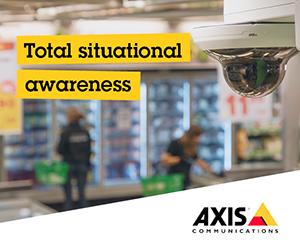Law enforcement
Employer Supported Policing - How ESP is creating a special relationship between retailers and Law Enforcement
If you ask most people what the acronym ESP stands for, they would probably answer extra sensory perception or the ability to foresee events through means other than the physical senses we are all born with. However, there is another kind of ESP offered by dedicated individuals who are providing a service beyond what most people would perceive as their day jobs. ESP - Employer Supported Policing - is a successful initiative where volunteers who by day may stack shelves, decipher spreadsheets, or manage stores while in their spare time form a vital part of the fight against business crime.
It is said that issues surrounding modern policing and its relationship to business crime are far from black or white. In recent years, another colour has been mixed into what has become a messy palate as the “thin blue line” - a phrase coined to reflect the financial pressures depleting the numbers of visible Police officers on patrol in towns and cities across the UK.
Post 2008, the mantra of “we’re all in this together” rang loud and clear across force boundaries as Britain’s forty-three constabularies were encouraged to make across-the-board cuts averaging 20 per cent. These belt-tightening economies have cut deep through residual fat and into the muscle to the point where senior officers have argued with the Government that, in an environment of increasing terrorist activity and sophisticated cyber-attacks targeting vital infrastructure, they can go no further without impacting front-line priorities.
In recent months, concessions have been noted as has the recruitment crisis that has seen thousands of experienced officers leave their posts. The Government has for the first time agreed to lift the 1 per cent pay cap on front-line officers, who apart from prison officers are the only public servants to be offered a larger wage increase, which critics have seen as a recognition of a deepening law enforcement crisis where talent and experience have been allowed to haemorrhage away.
This has left business in an invidious position; the UK’s wealth creators and biggest contributors to the Treasury through corporation tax receipts are no longer - and many argue, never were - a Police priority despite being at the sharp end of vicious assaults, verbal abuse, hate crimes targeting non-UK store staff, cross-Police-border organised retail crime, industrial-scale cyber-fraud, and terror attacks.
Despite this, many forces still cannot or, for budgetary reasons, will not automatically respond to calls for assistance from retailers who are often reporting serious incidents involving knives. Many such incidents are dealt with by logging the incident and a telephone follow-up interview.
In addition, large-scale commercial frauds are no longer the preserve of the Police but must in the first instance be reported through Action Fraud. But with a single online report taking an average of twenty minutes to complete, many retailers no longer record offences. Even when they do, many crimes do not meet the threshold of action - arbitrated upon by the National Fraud Investigation Bureau (NFIB) - and will not be referred to a specific force for further investigation. Most victims who report to Action Fraud never receive a response or a resolution to what might be a fraud involving tens of thousands of pounds.
The problem is so acute that many retailers are funding their own crime reporting through the National Business Crime Solution to piece together cross-border criminal activities and MOs (modus operandi). Others are collaborating with town centre management teams, BIDs (Business Improvement Districts), and business crime partnerships to fund their own security support to help make town centre visitors feel welcome and safe, although many Police forces frown upon such operations encroaching upon their own spheres of activity.
So where does the answer to this lie? What solutions exist that please everyone - the business community trying to protect their people, property, and profits and the Police trying their best to spread themselves as equitably as possible without further fracturing their already fragile reputation?
Is there, for example, a way that allows additional front-line officer support and provides experienced business analysts to support the efforts of cyber-detectives working at the City of London Police, the UK’s lead force for fraud investigation?
If You Can’t Beat Them, Join Them?
The answer to the modern Police recruitment crisis could lie closer to home through an initiative that has been around since 2010: Employer Supported Policing through the special constabularies (the “specials”) and Police support volunteers (PSVs), those who assist investigations through back-room analysis of cyber-activity crime data as extensions of their own roles as financial analysts in their own businesses.
It is believed that special constables or “parish officers” have been around since 1861 to supplement the role created by the UK’s fledgling Police forces, but according to records, “peace officers” date back to the time of the Anglo-Saxons. In the ninth century, at the time of Alfred the Great, if someone committed a crime, it was his family’s responsibility to bring him to justice. If this did not happen, the local peace officer was dispatched to find the fugitive.
Following the Norman invasion in 1066, the role evolved into what we still know today as constables.
The Government moved to put the special constabulary on a new footing in 1831 with the passing of “An Act for amending the laws relative to the Appointment of Special Constables, and for the better preservation of the Police.” The provisions of this Act still form the basis of the constitution of today’s special constabulary.
The Act included many provisions, including a new power allowing local authorities to appoint special constables for the purpose of preserving the peace should they consider existing Police numbers inadequate for doing so.
This was two years after Sir Robert Peel established the forerunner of the Metropolitan Police in 1829, which saw the establishment of a full-time paid force in the form of the famous British “Bobbies,” an affectionate tribute to the former Prime Minister and Home Secretary.
However, England was behind the curve as Police forces had already been formed in Scotland and Ireland as early as the end of the eighteenth century.
Today the specials still hold a special place in the pantheon of law enforcement initiatives. A Home Office backed programme, there are 217 businesses currently assisting the ESP scheme, which although not a new solution, could, if recruited from business in sufficient numbers, plug a vital gap as well as directly support the business communities they represent.
Unique to the UK, the specials have no comparative opposite in Europe, although reservists do perform similar functions in parts of the US and Canada.
Although there may be subtle regional differences to special constable roles - they cannot hold a drinks or security licence in Scotland, for example - all front-line volunteers undergo the same training (four to five months) as regulars and have the same powers of arrest and disciplinary procedures. The only difference lies in the fact that they are not trained in firearms in the same way as full-time Police officers.
All are first-aid trained as well as able to provide more empathetic support. At the time of the terrorist attack in Manchester in May this year, 197 specials attended the arena bombing, and post event, 333 provided a blue shield of greater visibility for the public, alongside regular officers who wanted to offer immediate reassurance to a city in profound shock.
Retailers such as Tesco and IKEA have already signed up to the programme, which according to Tina Shelton, regional citizens policing coordinator for Greater Manchester Police (GMP), has been a real boost for the businesses and the individuals involved.
“ESP contributes to increasing the diversity of knowledge within the workforce, offers a rewarding scheme to participate in, and supports the ethical and community aims of many organisations. Police visibility increases, crime is reduced, and communities feel safer,” she said.
Tesco has more than eighty specials (trained volunteer officers) and as such is the biggest retailer to invest its people and time in the service. It was also the first national supermarket to sign up to an enhanced ESP programme and has, to date, given more than 1,000 hours of free policing back to the community.
Matthew Reid, a volunteer special constable in Lancashire who works as a customer assistant at Tesco, said, “It can be tricky balancing my work and social life with my role as a special, but Tesco is really flexible with my shifts to enable me to combine my paid and volunteer duties. They offer five additional paid leave days per year under the ESP scheme, which really helps towards fulfilling my role as a volunteer Police officer in the community.
“I really enjoy engaging with different members of the community, and it gives me a lot of satisfaction to be able to attend a variety of incidents to help solve community issues.
“I have also seen the not-so-great side of life, which has helped develop my resilience and communication skills, all of which are transferable into my paid workplace. I would definitely recommend it. I am proud to put on my uniform, and there is always the attraction of every shift being different, and you learn to expect the unexpected. I have developed skills that I can bring back to both my personal and paid work life, which I would not have experienced otherwise.”
Part of Shelton’s remit is to encourage more businesses like Tesco to register on the ESP scheme by extolling the virtues of the scheme to participating companies and their staff as well as promoting the positive contribution to local community policing. Those wishing to take on a Police support volunteer role do not have to take on the physical beat officer training but can contribute through intelligence, a vital service to both business and the Police as many companies harvest data on fraudulent activity as part of their evidence packs they hand over to the Police or Action Fraud.
In terms of giving back to the businesses that support staff who are specials via the ESP scheme, it is argued that they could supplement the security at their own stores at peak time in the stores. The reciprocity of the programme is clear for all to see. For the business, the service is supporting their local communities, reducing crime, and making them safer, as well as providing an additional training scheme for their staff. Staff retention is also improved as such flexible arrangements encourage loyalty, and it is also a tax-efficient initiative for the business because it is classified as “tax effective giving” under Treasury rules.
Employees receive a more rounded work and placement experience, continual professional development (CPD), and enhanced skills training, as well as flexible working hours.
The existing Police force benefits from additional resources, and the public feel more reassured as part of this virtuous circle of positive business engagement. There are also positive mental health benefits according to United Healthcare, which found improved physical and emotional health and a more positive attitude towards employers among community volunteers.
Andy Holder, a card alerts customer service advisor with Santander, said, “As a special constable, I can make a positive impact upon people’s lives, and this is a gift that will keep on giving. Living within Lancashire and completing my policing degree at the University of Central Lancashire has meant that the county has a big part in my heart. Helping to keep the streets of my home safe is something I will always be honoured to do. Santander totally supports my volunteer role by giving me ten days additional paid leave per year - this makes the work/life balance much easier.”
From the Police perspective at a time of adversity, ESP has been welcomed with open arms. Ian Hopkins, the chief constable of GMP said, “ESP is a great way for organisations to invest in their people as well as their local communities. Both special constables and Police support volunteers can help increase the diversity of knowledge within the workforce and enhance service delivery, which can contribute to a safer, more resilient, and empowered society, leading to community well-being and stronger connections between the Police, businesses, and the community.”
Cyber
Police support volunteers do not have to undergo the same physical checks demanded of front-line specials, but their roles could be critical in the fight against the scourge of cyber-crime. Many PSVs already volunteer in back office finance roles as analysts and have an immediate advantage when it comes to reading irregular algorithmic digital patterns. In this capacity, they are opening up their expertise to serving Police officers working in cyber-units at the front end of the battle for cyber-space. This two-way learning can help educate officers working in the fraud space.
This arena, according to the prime minister, is one of the Government’s priority targets, and the fact that major cyber-scams could be unscrambled by volunteer community workers on loan from their day jobs is a financial windfall for an administration struggling to balance the economy and reign in public spending.
Despite the charm offensive from the Home Office to recruit thousands more companies to volunteer their staff, some retailers still have reservations mainly surrounding the fear that they may lose staff to the regular Police force, although statistics among recruits over thirty suggests that this risk is limited because staff enjoy the variety and flexibility of both roles.
There is also health and safety and potentially brand-damage concerns around emboldened specials becoming “have-a-go heroes” in a store robbery or angry customer showdown scenario where ordinarily staff training focuses upon being non-confrontational in the face of aggression.
Despite the concerns around the role of ESPs, if numbers could increase, it could positively impact policing numbers and provide the reciprocity required to re-engage with a business community starved of Police support.
That is why there is a call to arms for more businesses to join the scheme. Any retail company wishing to become part of the ESP initiative can contact esp@dutysheet.com or Tina Shelton, regional citizens in policing coordinator - North West & Wales at 07901 678600 or tina.shelton@gmp.police.uk.





